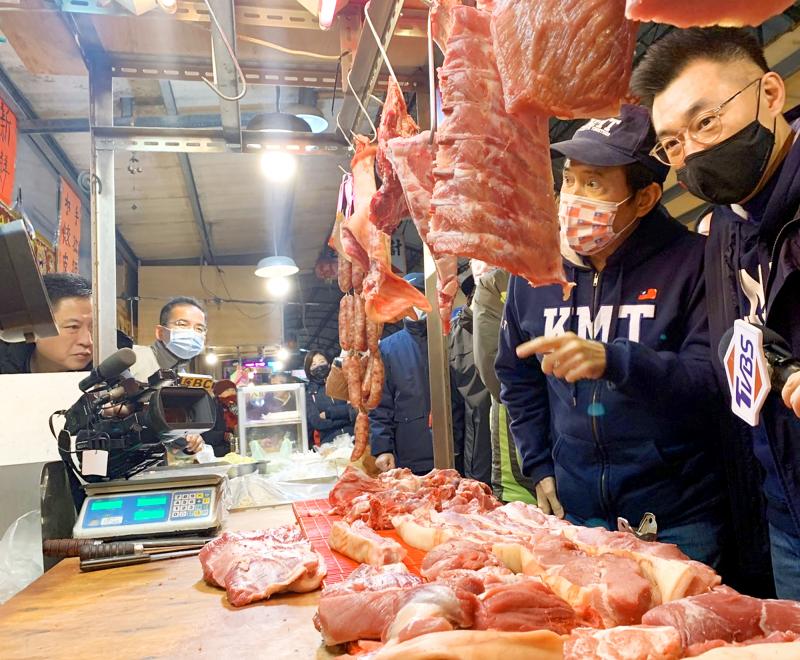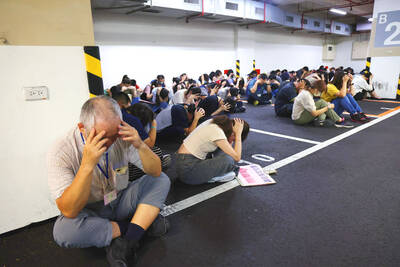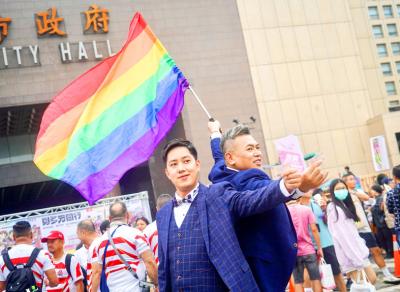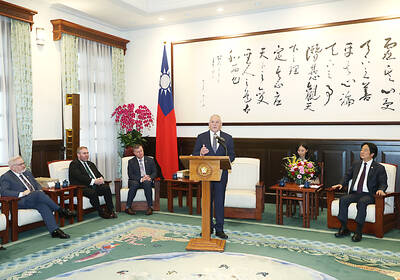The Chinese Nationalist Party (KMT) yesterday touted its proposed referendum on imports of pork containing traces of ractopamine after accusing the government of using strong-arm tactics to ease meat import regulations.
The members of President Tsai Ing-wen’s (蔡英文) administration “acted like bullies” by forcing the importation directives through the Democratic Progressive Party (DPP)-controlled legislature, and when the Executive Yuan annulled local governments’ regulations banning ractopamine in pork, KMT Chairman Johnny Chiang (江啟臣) said at a petition stand in Taoyuan’s Jhongli District (中壢).
“The KMT does not believe in letting people eat dubious food products, and that is why former president Ma Ying-jeou (馬英九) separated beef and pork [in import regulations], and banned the import of offal and meat from cattle over 30 months of age” during his presidency, Chiang said.

Photo: CNA
“Competent leaders should be able to resist political pressure to protect public health,” he added.
Passing a referendum has become more difficult after the DPP tightened the limits of the Referendum Act (公民投票法) in 2019, a reversal of its historical stance on the issue, Chiang said.
Referendums have now been decoupled from elections, and referendums are now held every two years on the fourth Saturday of August, with the next possible date being Aug. 28.
The KMT considers the law to be overly stringent and has submitted a proposed referendum to ease the restriction on referendums, in addition to the one on pork containing ractopamine, he said.
On Dec. 18 last year, the Central Election Commission said that the referendum proposal championed by Chiang and another by KMT Legislator Lin Wei-chou (林為州) complied with all regulations and could proceed to the second stage.
Chiang’s proposed referendum question would read: “Do you agree that referendums should be held on the same day as nationwide elections, if a nationwide election is scheduled to be held one to six months after a referendum proposal has been approved?”
Lin’s proposed referendum question would read: “Do you agree to a total ban on the importation of pork and related products containing leanness-enhancing additives (ractopamine and other beta agonists)?”
Under the act, the KMT has six months to collect nearly 290,000 valid signatures, or no less than 1.5 percent of the total electorate in the most recent presidential election.
However, the party is hoping to collect enough by March to have sufficient time to verify the signatures before Aug. 28.
The KMT yesterday launched a nationwide signature drive for its two referendum proposals.
Starting from yesterday, campaigning would take place in each of the 159 electoral districts that are represented by KMT lawmakers and county or city councilors, the party said.
People interested in taking part can download and print the petition free of charge at 7-Eleven stores nationwide using the self-serve ibon machines, the KMT said,
People should select the scan and print function, then the enterprises cloud drive, then ASUS cloud storage, and input ASUS6BIV6MG7S to open and print the file, the party said, adding that the form should be filled out, signed and mailed to the KMT’s headquarters.
The KMT’s official app would provide the locations of the KMT chapters’ liaison offices, elected officials and other partners to whom the petitions could be mailed, it said.

Taipei on Thursday held urban resilience air raid drills, with residents in one of the exercises’ three “key verification zones” reporting little to no difference compared with previous years, despite government pledges of stricter enforcement. Formerly known as the Wanan exercise, the air raid drills, which concluded yesterday, are now part of the “Urban Resilience Exercise,” which also incorporates the Minan disaster prevention and rescue exercise. In Taipei, the designated key verification zones — where the government said more stringent measures would be enforced — were Songshan (松山), Zhongshan (中山) and Zhongzheng (中正) districts. Air raid sirens sounded at 1:30pm, signaling the

The number of people who reported a same-sex spouse on their income tax increased 1.5-fold from 2020 to 2023, while the overall proportion of taxpayers reporting a spouse decreased by 4.4 percent from 2014 to 2023, Ministry of Finance data showed yesterday. The number of people reporting a spouse on their income tax trended upward from 2014 to 2019, the Department of Statistics said. However, the number decreased in 2020 and 2021, likely due to a drop in marriages during the COVID-19 pandemic and the income of some households falling below the taxable threshold, it said. The number of spousal tax filings rebounded

A saleswoman, surnamed Chen (陳), earlier this month was handed an 18-month prison term for embezzling more than 2,000 pairs of shoes while working at a department store in Tainan. The Tainan District Court convicted Chen of embezzlement in a ruling on July 7, sentencing her to prison for illegally profiting NT$7.32 million (US$248,929) at the expense of her employer. Chen was also given the opportunity to reach a financial settlement, but she declined. Chen was responsible for the sales counter of Nike shoes at Tainan’s Shinkong Mitsukoshi Zhongshan branch, where she had been employed since October 2019. She had previously worked

‘NON-RED’: Taiwan and Ireland should work together to foster a values-driven, democratic economic system, leveraging their complementary industries, Lai said President William Lai (賴清德) yesterday expressed hopes for closer ties between Taiwan and Ireland, and that both countries could collaborate to create a values-driven, democracy-centered economic system. He made the remarks while meeting with an Irish cross-party parliamentary delegation visiting Taiwan. The delegation, led by John McGuinness, deputy speaker of the Irish house of representatives, known as the Dail, includes Irish lawmakers Malcolm Byrne, Barry Ward, Ken O’Flynn and Teresa Costello. McGuinness, who chairs the Ireland-Taiwan Parliamentary Friendship Association, is a friend of Taiwan, and under his leadership, the association’s influence has grown over the past few years, Lai said. Ireland is